The showdown over Snowden and the NSA; why the Church must be a new kind of open space in the surveillance world.
By Christian Iosso
A recent Thom Hartmann essay for Truthdig ended with the assertion that it is again time for a Pastor Niemoller, who famously summarized Germany’s fall into Nazism with the statement:
[wpcol_2third id=”” class=”” style=””]First they came for the communists,
and I didn’t speak out because I wasn’t a communist.
Then they came for the socialists,
and I didn’t speak out because I wasn’t a socialist.
Then they came for the trade unionists,
and I didn’t speak out because I wasn’t a trade unionist.
Then they came for the Jews,
and I didn’t speak out because I wasn’t a Jew.
Then they came for the Catholics,
and I didn’t speak out because I wasn’t a Catholic.
Then they came for me,
and there was no one left to speak for me.[/wpcol_2third] [wpcol_1third_end id=”” class=”” style=””]
![]() [/wpcol_1third_end]
[/wpcol_1third_end]
This editorial was started before the current showdown over Edward Snowden in the Moscow airport, and its goal is to provide an ethical and theological argument for viewing whistleblowers like him as prophets. By suggesting that it is Niemoller time, I am not suggesting the US is close to Nazism. Rather, what Snowden and the Guardian newspaper have done is expose the “Not-See” national security party for what it is: a massive military-edged bureaucracy that uses threats of terrorism to justify spying on US and foreign citizens and governments. This affects not only our civic freedom but our spiritual freedom and thus involves our faith. “In secrecy we trust” is the new motto Bill Quigley has suggested for our coins.
Mr. Snowden should remain free until Congress or the courts can protect his rights, and Mr. Putin does well to resist the pressure for his rendition to the US. Otherwise he is likely to suffer the same fate as Bradley Manning: humiliating psychological abuse, long isolation, and a trial seemingly rigged to convict that leaves out key moral considerations.[i]
In defending the vast data-gathering, the primary argument is that these methods have prevented 30 or so terrorist acts and that all have been approved by a secret court. At the same time, US officials have been forced to correct false testimony by Snowden’s leaks, leaving the nature of the alleged terror threats and the alternatives available to the police agencies quite unclear. Certainly our European allies are not happy to have international summit leaders and ambassadors treated as potential terrorists, but this starts with the infringement of our rights as US citizens.
The Scope of Surveillance and its Enforcement
Thom Hartmann rightly points out that there has been a clear encroachment on civil liberties since 9/11 that has followed the adoption of the Patriot Act and the massive growth of the surveillance state in America. The Peace Discernment report of the PCUSA summarizes early reports of Washington Post researchers who later published a book on the growth of the security establishment, much of it headquartered around the District of Columbia. In those reports we learned that, as of July 2011, “some 1,271 government organizations and 1,931 private companies work on programs related to counterterrorism, homeland security, and intelligence, with an estimated 854,000 people holding top-secret security clearances.” [ii]
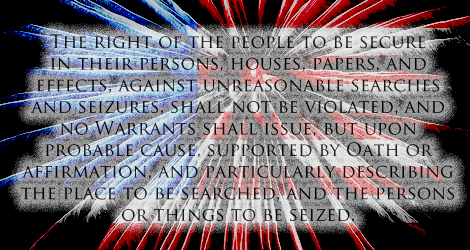
Hartmann draws attention to the conscience and bravery of Bradley Manning, Julian Assange, and now Edward Snowden, a military contractor employee who has no formal rights to protect his documentation that all US phone traffic “meta” data is provided to the National Security Agency (NSA). The Obama Administration has prosecuted at least six persons under the Espionage Act of 1919 for leaking secrets, including Thomas Drake, who revealed massive government waste, and John Kiriakou, who revealed information about US water boarding and other torture.[iii] Coupled with investigations of other government officials, these prosecutions—well before Snowden, and more than any other President—prompted Time Magazine to call them “Obama’s Hard Line.”[iv] A November 2012 Google report indicated that US intelligence agencies requested information 7,969 times on 16, 281 accounts in the first half of that year, up from previous years.[v]
Snowden leaked National Security Agency authorizations for “big data” gathering of all US personal and business phone calls for data-mining of key words or tracking of particular individuals. This goes well beyond tracking all phone calls and email going between the US and other nations, which has long been assumed, leading some companies to offer regular encryption. Snowden also released information on the PRISM program, which enlists the big private data companies to provide access to the NSA. Further information may be released as Glenn Greenwald, the lawyer-reporter with The Guardian newspaper who worked with Snowden, says there are more documents to come.
The legal basis for these surveillance programs was taken from the Patriot Act adopted after 9/11, with some secret decision annexes. But the scope and magnitude of the data collection and claims made on internet providers are seen to have widened considerably the interpretation of an already broad license to spy on Americans. By analyzing who calls whom where and for how long, or the subject lines of email, considerable intelligence is collected even without operatives listening to or reading content (the logistical information is called “meta data”). Defenders of data collection on everybody suggest that there is a balance or trade-off between privacy and security, but Snowden confirmed suspicions as to how much that choice is being made without us.
___________________________________________
Thus For all those in prisons who will never again see the light of day, whose only companion is God in solitary, may we remember that freedom is not a personal possession but a quality of common life. To live in fear of the infinite sentence, the indefinite detention, under constant surveillance, is to be—at least partly—in jail.
___________________________________________
One basic problem, as Bill Quigley and others have pointed out, is that the government can and does also listen to the content of calls, despite deceptive statements made under oath by intelligence officials. Quigley counts over 300,000 when the contacts of all persons under surveillance are tallied:
–4,968 Foreign Intelligence Surveillance Court requests for full surveillance from 2010-12 (the government withdrew 8 requests, but none were turned down by the secret court, where no defense voices are present.)
–56,027 National Security Letters from the FBI, 2010-12, no court approval needed.
–2732 “wiretap” requests by other law enforcement agencies, many on drug matters. (These are “content” requests; “on average, each wiretap intercepted the communications of 113 people,” and not all states report)
-Company reports: Apple (9-10,000 requests for consumer data, 12/1/12—5/31/13), Microsoft/Skype (75,378 requests on 137,424 accounts worldwide in 2012), Yahoo (12-13,000 requests from July to December, 2012)…[vi]
Not all of the Big Ears belong to government. Wikileaks—suspected of receiving thousands of email on the real war in Iraq from Bradley Manning—has also published email hacked from the private security website, Stratfor, which reveal considerable cooperation and information sharing between business and government.[vii]
There is surveillance of environmental organizations,[viii] the Occupy movement, and Muslim mosques in NY and elsewhere done on more of a direct selection basis by local and national authorities.
Clearly, then, any of us could have our phone and internet records subpoenaed if we were linked to a group under suspicion of terrorism or support for anything related to it. With regard to other countries, the US and Britain have a particularly close exchange of data, while information is gathered on many other countries—including US official hacking of Chinese government and government related sites.[ix] Beyond US citizenship rights, then, the surveillance of other countries’ citizens has foreign policy ramifications, and affects the balance of the Pentagon, the CIA/NSA/FBI and other secret agencies, and the State Department. As for Congressional oversight by the intelligence committees, this involves a small number of elected officials who cannot reveal what they learn, rendering their oversight quite weak.[x]
Questions For Christian Citizens and the Church
While the political debate over domestic surveillance involves constitutional questions, the religious and theological debate involves not only human rights and civic freedom, but also the freedom of the church to stand in its own space, resisting the de facto idolatry that comes with the national security state. On the political level, this is a bipartisan concern for our “inalienable rights” against “unreasonable search and seizure” and for privacy safeguards to protect a zone of individual conscience. As many progressives cheered on Rand Paul as he filibustered against unlimited drone warfare, so many conservatives and libertarians may cheer on Snowden for revealing Big Brother’s Big Ears. But the church’s vision is larger and more foundational. As Rev. David Moore said in his benediction at the Presbyterian Church in Rensselaer right after the NSA documents were made public, “God’s surveillance and sovereignty are higher and deeper than all government surveillance and security claims.”
So how does the church justice community relate to the whistle-blowers and the broader public they seek to protect? How do their actions and the responses of our government affect faith as a form of spiritual freedom and moral responsibility? Are the whistleblowers conscientious objectors to the national security state? What is the right framework for determining the consequences of and punishment for their acts—especially when secrecy prevents transparency and when congressional oversight is easily neutralized? If Constitutional protections of the First and Fourth Amendments are superseded by a constant state of cyber-warfare, are whistleblowers effectively struggling for civilian control over the military, a basic democratic principle? Or are we criticizing new forms of technology that necessarily unites corporate and governmental powers to defeat real threats?
Limitless surveillance poses at least three kinds of threat to the churches, one related to the characteristics of the National Security State; a second related to the free space of the church within that state; and a third related to the calling of prophets, who are still sent to awaken the consciences of all. Looking at these three areas will not answer all of the questions listed, but should underline the need to see what our government and internet companies are doing.
National Security State = Perpetual Warfare
For the first threat, a good description comes from Jose Comblin’s The Church and the National Security State (Orbis, 1979). Robert McAfee Brown summarized its basic assumptions in 1986:
“1. The State is an end in itself; the state does not exist for the welfare of its people, people exist for the welfare of the state. All states are a threat to each other, so each must strive to be supreme over its rivals.
2. The human condition is therefore one of ongoing warfare. So-called ‘peace’ is only a waging of war by other means, an interval or breathing space between the normal periods of military conflict.
3. Since the state is the highest good, any means to ensure its survival are legitimate. Spying, infiltration, secret police, lies, torture, files on all suspicious persons, are the normal and legitimate activities of the state for its own survival.
4. The support of the state is in the hands of the military. Even when civilians are nominally heads of state, they serve at the pleasure of the military, any veneer of ‘elections’ to the contrary notwithstanding….
5. The universal enemy is communism [substitute: terrorism or militant Islam, post 9/11/11, ed.], which can be defined as any group or point of view that does not totally support the national security state. All challenges, internal or external, are automatically communist.
6. The church is expected to be a loyal partner of the national security state, consistently pro-state and anti-communist, helping to demonstrate that the …state is the last best hope for the survival of Christian civilization.”[xi]
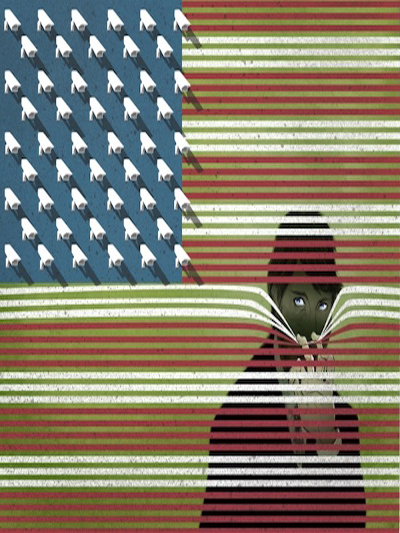
Surveillance extends the scope of national security to put all citizens under a form of supervision that “securitizes” (or defines as potential threats) entire areas of discourse, increasing suspicion of all international relations. Surveillance elevates secrecy and the role of spies far beyond the Realist understanding that all states and groups seek their own interests; it enhances militaristic traits; it increases the confusion of patriotism and nationalism. While item 5 in the Comblin/Brown list clearly reflects the brutal dictatorships supported by the US during the 1970’s and ‘80’s, the subservient role of the church is still a clear danger. Today we might also put the cooperation of military and corporate interests more under the heading of ‘empire,’ with market-ideology taking over from anti-communism.
Church & State
For the second threat, we are concerned with both the inner life of individuals and the inner life of the church. Historically, the First Amendment sees religious liberty as a key component of the civic freedom that puts limits on the powers of government. A recent treatment of this tradition can be found in Robust Liberalism: H. Richard Niebuhr and the Ethics of American Public Life, where Timothy Beach-Verhey examines the public role of the church in America, navigating between accommodation or acculturation and self-enclosure, which would be a religious form of isolationism. Beach-Verhey lifts up Niebuhr’s awareness that “The Church must realize that it is responsible to God rather than to the world or any part of it.”.[xii] That God is universally related to the world should prevent idolatrous fixation on any nation, race, class or the church itself. This is an argument for the church’s independence and its capacity to connect ecumenically across borders.
The inner life of the church should also model God’s valuing of all people and ways of hearing their voices. In other words, regardless of polity, the church should be a zone of freedom for the deepest questioning and trusting openness. It needs to be able to communicate without repression to articulate its own values. Although they have survived under repression for generations in some places, it is extremely difficult for churches to be healthy communities of blessing, peace and truthfulness in the context of war.
US churches learned a difficult lesson when congregations active in the mid-1980s’Sanctuary Movement were infiltrated by informants who recorded conversations and sought evidence of sheltering people fleeing the death squads of El Salvador and Guatemala. The Presbyterian and Lutheran Churches filed suit against the Federal Government for the violation of their sanctuaries and, in a way, a challenge to the freedom of the pulpit. The suit was based not only on the First Amendment’s religious and other freedoms, but also on the Fourth related to “unreasonable searches” and the Fifth, alleging a lack of “due process” because a “compelling governmental interest” had not been established by any court. The churches argued that Immigration and Naturalization Service infiltration crossed the Church/State line but lost the case when 8 pastors and church workers were convicted of trying to protect refugees from deportation, although given suspended sentences. In 1990, however, a larger group of churches won a related case when the government allowed temporary asylum for 500,000 Salvadorans and Guatemalans who had a justified fear of persecution.[xiii]
___________________________________________
To the extent that God’s realm is non-instrumental, non-commercial, and non-coercive, its communal and physical representations should resist intrusion by those powers and values.
___________________________________________
Many theologians and ethicists have addressed the church’s integrity and distinctive values, its need to maintain its internal cultures, and its ability to nurture prophets as well as priests and preachers. Unlimited surveillance, in my view, shrinks the horizons of all social groups and beings, affecting our sense of boundaries, confession, privacy, community, and mystery. While drones can be a clear hovering presence, perhaps photographing all below, surveillance penetrates space in a different way and enlists people without their assent.
Space limits in this article prevent a fuller analysis of the distinctive space occupied by the church, based on understandings of God’s mystery and sacredness and often symbolized by holy ground, altars, and chancel areas. Michel Foucault, the analyst of intrusive and closed institutions, proposed a concept of heterotopias, separate spaces defined by particular relations and purposes, even counter-sites, that unlike utopias really exist.[xiv] If the church were considered such a space, part of its construction is the respectful view of the human that depends upon acknowledging that “God sees not as humans see.” To the extent that God’s realm is non-instrumental, non-commercial, and non-coercive, its communal and physical representations should resist intrusion by those powers and values.[xv]
The Prophetic Calling
Thirdly, surveillance threatens our understanding of prophet, which is larger than, but includes, the category of whistleblowers like Edward Snowden and Bradley Manning. Like prophets, whistleblowers take risks to uncover wrongdoing, but not all prophets are insiders—or ex-insiders.
Following the biblical model, prophets are called by God to speak truth and stand up to power on behalf of justice. Facing Old Testament kings, they call for national obedience to the covenant and sometimes repentance, even personal repentance in the case of Nathan before David: “You are the man” (who sent Uriah to die in battle; see 2 Samuel 12). Amos used a plumbline to illustrate the need for right judgment and integrity. Jeremiah delivers denunciations (some of which are literally ripped up) and is punished, but also looks toward a future beyond exile by buying a field on land occupied by an invading army. Prophecies are not generally predictions but conditional warnings based upon their understanding of God’s will. Some were delivered in poetic form; the important thing was to reach people effectively, often despite the opposition of the king and queen (see Elijah opposing Ahab, I Kings 18-21). These stories influence our historic understanding of church/state separation, based in the independence of the church, and also speak to the accountability of all government before God.
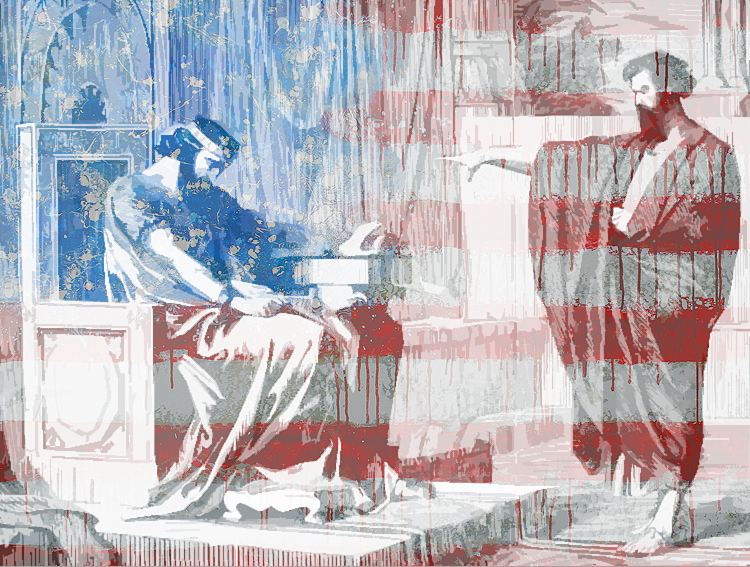 Turning to whistleblowers, it is important to focus on their message more than the messenger. Is the information true? Do people have a right to receive it? Does government (or a corporation, or a church institution) have a right to withhold it? It is important to address the moral motivation of such people, and to envision the role of prophetic communities like the Sanctuary movement, without being distracted by ad hominem attacks on individuals or demonization of dissident groups. Whistleblowers not only challenge secrecy, but they inevitably challenge hierarchical authority, habits of deference, and financial interest.
Turning to whistleblowers, it is important to focus on their message more than the messenger. Is the information true? Do people have a right to receive it? Does government (or a corporation, or a church institution) have a right to withhold it? It is important to address the moral motivation of such people, and to envision the role of prophetic communities like the Sanctuary movement, without being distracted by ad hominem attacks on individuals or demonization of dissident groups. Whistleblowers not only challenge secrecy, but they inevitably challenge hierarchical authority, habits of deference, and financial interest.
It is in the interest of all those in power to join in suppressing disruptive acts of individual conscience—as we see in Congressional leaders joining with the surveillance agencies and the Obama Administration in attacking Edward Snowden, who has now been made stateless by cancellation of his passport without due process. Yet the term whistleblower still commands respect because it means a person who knows a higher loyalty than institutional conformity or subservience.
___________________________________________
While the political debate over domestic surveillance involves constitutional questions, the religious and theological debate involves not only human rights and civic freedom, but also the freedom of the church to stand in its own space, resisting the de facto idolatry that comes with the national security state.
___________________________________________
Michael Hayden, former NSA and CIA Director, attacked Edward Snowden personally on BBC news on Tuesday, June 24, denying that he was a whistleblower and calling him a “narcissist.” For Hayden, a whistleblower “raises his hand inside an organization over something that makes him uncomfortable,” points to something illegal (which “none of this (surveillance) is”), and doesn’t flee. This is a remarkably self-serving definition from a man involved in the warrantless surveillance controversy during the second Bush Administration, as well as the CIA drone and covert warfare programs and “enhanced interrogation.” It was also a transparent effort to change the subject away from the real risks and sacrifices being made by Snowden to bring government secrets into the light, out of the shadows where Hayden spent most of his career. Granted, then, that whistleblowers make moral conflicts unavoidable, like other prophets, and also expand moral space—aiding all those who value the truth.
Should Snowden (and Manning, and others) have revealed all that he has revealed of how the intelligence agencies conduct their business? This is partly a matter of balance between security and freedom, as President Obama has noted. There is even a congressional panel, largely moribund, that was set up to address the question, and there are vestiges of accountability in the congressional oversight committees. Unfortunately, as the American Civil Liberties Union has pointed out, “secrecy poisoning” impairs public accountability and the constitutional balance of powers.[xvi] But beyond the possible trade-off of security and freedom, there is a third area of concern: the nature of communities, relationships, and spiritual life under a surveillance horizon. Orwell was a prophet and perhaps whistleblower on this Big Brother effect.
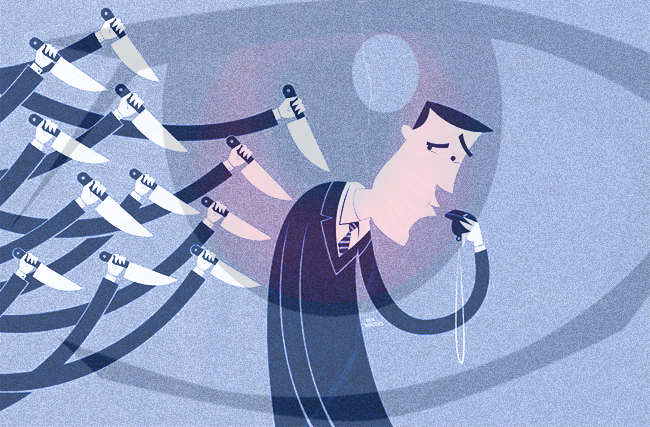 Not all whistleblowers are prophets either, of course, and some have other moral flaws. But to the extent they are punished for telling the truth, they challenge the legitimacy and not just the authority of government. To the extent the legal system abandons them, it exposes the vulnerability of all citizens, for we are far closer to Ed Snowden than Michael Hayden. Thus For all those in prisons who will never again see the light of day, whose only companion is God in solitary, may we remember that freedom is not a personal possession but a quality of common life. To live in fear of the infinite sentence, the indefinite detention, under constant surveillance, is to be—at least partly—in jail. And to prevent that kind of life, let us remember the example of whistleblowers and prophets—like Martin Niemoller, Daniel Ellsberg, and … who’s next?
Not all whistleblowers are prophets either, of course, and some have other moral flaws. But to the extent they are punished for telling the truth, they challenge the legitimacy and not just the authority of government. To the extent the legal system abandons them, it exposes the vulnerability of all citizens, for we are far closer to Ed Snowden than Michael Hayden. Thus For all those in prisons who will never again see the light of day, whose only companion is God in solitary, may we remember that freedom is not a personal possession but a quality of common life. To live in fear of the infinite sentence, the indefinite detention, under constant surveillance, is to be—at least partly—in jail. And to prevent that kind of life, let us remember the example of whistleblowers and prophets—like Martin Niemoller, Daniel Ellsberg, and … who’s next?
Chris Iosso is Coordinator of Social Witness Policy at Presbyterian Church (USA), and the Executive editor of Unbound.
NOTES:
[iii] https://knightcenter.utexas.edu/blog/00-13889-obama-administration-has-aggressively-prosecuted-leaks-and-whistleblowers-who-are-they
[vi] http://truth-out.org/buzzflash/commentary/item/18044-more-than-300-000-in-us-wiretapped-during-last-year
[x] http://www.theatlantic.com/politics/archive/2013/06/2-senators-say-the-nsa-is-still-feeding-us-false-information/277187/
[xi] From Moving Toward Shalom: Essays in Memory of John Conner; Fellowship of Reconciliation, 1987; Gail Ricciuti & Dieter Hessel, eds. Available from ACSWP).
[xii] Beach-Verhey, Timothy Robust Liberalism: H. Richard Niebuhr and the Ethics of American Public Life (Waco: Baylor Univ. Press, 2011), p. 130.
[xiii] For a selection of articles from the Arizona Sun-Sentinel: http://articles.sun-sentinel.com/keyword/sanctuary-movement An account of the churches’ concerns is contained in Why Churches Fight Government Infiltration, available from the Advisory Committee on Social Witness Policy, [email protected].
[xv] For a description of the elusive characteristics of the self and soul in modern North Atlantic societies, see Rowan Williams’ Lost Icons: Reflections on Cultural Bereavement (Edinburgh: T&T Clark, 2000).
[xvi] http://www.networkworld.com/community/blog/aclu-congress-cancer-govt-secrecy-killing-ame
Image Attribution(s):
– Surveillance graphic courtesy of The Electronic Frontier Foundation.
– Church and State graphic courtesy of Tricycle Magazine.
– Whistle Blower courtesy of National Accountant Magazine. Modified by Editorial Staff.
– Elijah and Elisha courtesy of Michael O’Bryan.
– Surveillance 2010 by Will Varner. From the 2010 Communication Arts Annual.
– Panopticon Graphic by Unbound Editorial Staff.
– Surveillance Flag Graphic by Unbound Editorial Staff.

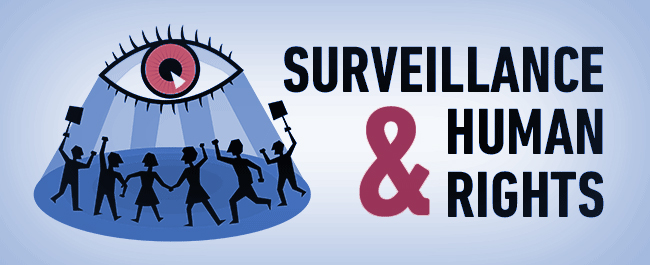
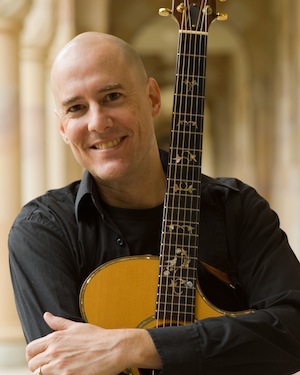
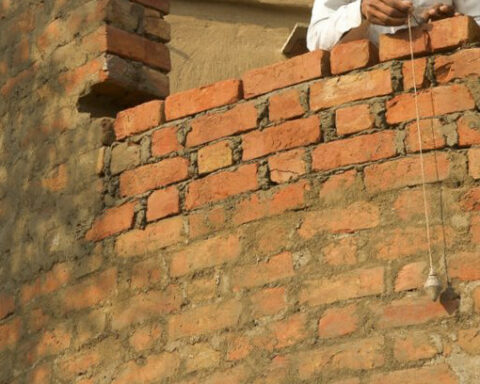
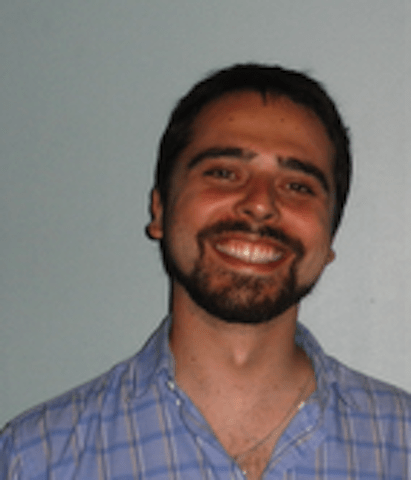
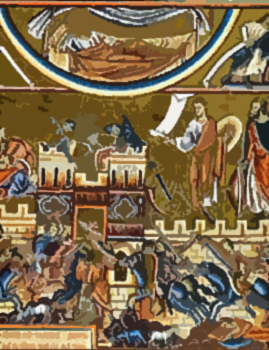
Unbound Social